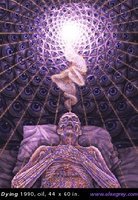 A bioethics that isn't informed by science isn't a bioethics at all.
A bioethics that isn't informed by science isn't a bioethics at all.This is the principle reason why I'll never settle for a static or absolutist vision of ethics or morality; conventions or so-called 'truths' are often overturned when new evidence comes to the surface. As John Maynard Keynes once said, "When my information changes, I change my opinion. What do you do, Sir?"
Such a thing is happening right now in regards to our perception of those stuck in a vegetative state and in how we treat them. As it turns out, these patients may not be as 'vegetative' as previously thought, nor in all cases are their conditions permanent. New and emerging information indicates that some of these individuals are experiencing some form of internal consciousness or mental state. Further, some of these patients have, quite shockingly, been revived by the most unassuming and unintuitive of things: sleeping pills.
In regards to conscious awareness, for example, a team in Cambridge recently discovered that a patient in a vegetative state can communicate through her thoughts. Their claim is a serious one: they say they have discovered a way to show preserved conscious awareness in a patient who has been diagnosed as vegetative. Specifically, by using a functional magnetic resonance imaging (fMRI) scanner, the patient's brain activity was mapped while she was asked to imagine playing tennis or moving around her home. The scientists found she was able to do this; the fMRI indicated that different areas of her brain were activated in the same way as healthy volunteers. Dr Adrian Owen, who led the research, had this to say:
These are startling results. They confirm that, despite the diagnosis of vegetative state, this patient retained the ability to understand spoken commands and to respond to them through her brain activity, rather than through speech or movement. Her decision to work with us by imagining particular tasks when asked represents a clear act of intent which confirmed beyond any doubt that she was consciously aware of herself and her surroundings.It is not clear to me, however, if this activity was indeed the result of the patient thinking about such things, or if the activity was some sort of unconscious autonomous response to verbal cues. Yet, despite this uncertainty, it's my opinion that medical practitioners should err on the side of caution and assume that the patient's reaction was a genuine conscious response.
And on a related note, some patients who were thought to be in an unrecoverable vegetative state are awakening after being administered a $5 over-the-counter sleeping pill called zolpidem. This pill seems to be invigorating brain cells that were once thought to be dead. The implications of this are broad, indicating a need to revisit assumptions about voluntary euthanasia, the current investment we put into this type of medical care, and the long-term recovery potential of these patients.
More specifically, and in consideration of possible conscious brain-state in some of these patients (obviously, this won’t apply to all people in permanently vegetative states; for many, necrosis has set in to the point where the capacity for conscious brain functioning has ceased and is truly unrecoverable), we will have to once again re-evaluate our conceptions and definitions of death and re-think how we should be treating people in these conditions.
The key will be to develop the scientific know how to detect which patients are permanently unconscious from those who have the capacity to receive sensory input and are experiencing internal awareness. Those patients with any semblance of consciousness must have their quality of care improved, including frequent visitors and other positive stimuli. And finally, medical scientists will need to work more diligently to devise ways of helping these patients emerge from their vegetative conditions.
This whole issue reminds of the haunting lyrics from “One,” a classic track from Metallica. It’s the story of a soldier who is trapped in a coma but has full conscious awareness. His experience is nothing less than hellish. I’ll end this post by reprinting the lyrics from the entire song:
I can't remember anything______________________
can't tell if this is true or dream
deep down inside I feel to scream
this terrible silence stops me
now that the war is through with me
I'm waking up, I cannot see
that there's not much left of me
nothing is real but pain now
hold my breath as I wish for death
oh please God, wake me
back in the womb it's much too real
in pumps life that I must feel
but can't look forward to reveal
look to the time when I'll live
fed through the tube that sticks in me
just like a wartime novelty
tied to machines that make me be
cut this life off from me
hold my breath as I wish for death
oh please God, wake me
now the world is gone I'm just one
oh God, help me hold my breath as I wish for death
darkness imprisoning me
all that I see
absolute horror
I cannot live
I cannot die
trapped in myself
body my holding cell
landmine has taken my sight
taken my speech
taken my hearing
taken my arms
taken my legs
taken my soul
left me with life in hell
Related reading:
Death and the brain: Recent voluntary euthanasia hullabaloos such as the Terry Schiavo case have revealed a public that’s largely divided and somewhat confused as to what death is and when it should actually be declared.
Fight for Your Right to Die: We must repeal laws against euthanasia if we're to copewith such future realities as cryonics and extreme life extension.

No comments:
Post a Comment